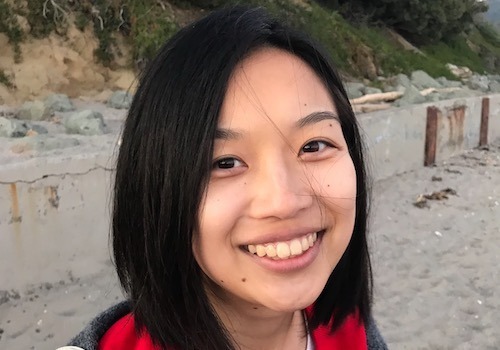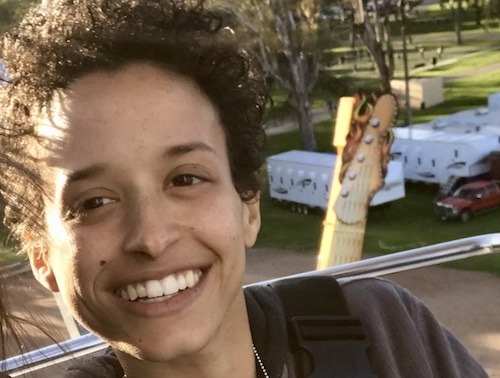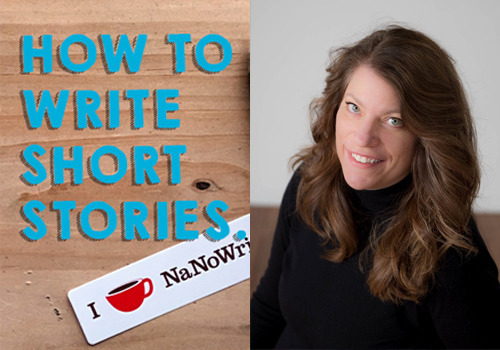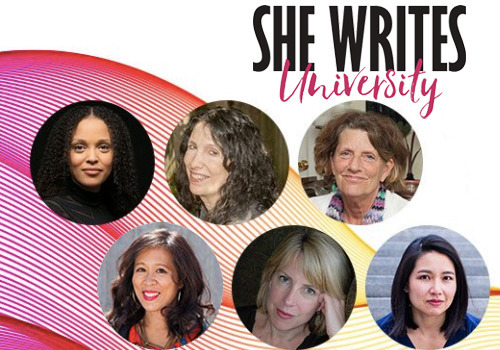Chris Baty's Blog, page 101
June 8, 2018
Congratulations, You’re a Writer!

What does it take to call yourself a writer? Sometimes, using this word is a challenge and an act of courage. Today, writer Lakiesha Edwards shares how NaNoWriMo has helped her embrace her own identity as a life-long writer:
You don’t have to be a rocket scientist to be a writer. People will tell you that there are certain qualities you need to be a writer: things like knowing how to spell, being aware of grammar rules, liking English as a subject, and actually enjoying sitting down and putting words on a page. But the truth is, all you need to be a writer is to write. All of those details are tools to help you get there.
I made this discovery after just jumping out here on the web once I wrote my first book. I’m pretty new to the whole writing world online, and I think it’s wonderful that places like NaNoWriMo exist. With NaNoWriMo, I found the support I’d been craving to help me push past the rough spots of writing: advice for overcoming writer’s block; encouragement to write every day; the drive to finish my work in progress rather than stall it with editing at the wrong times; connection to a community of other writers; how to have fun with the project I’m working on; and, most importantly, how to just write, write, write nonstop and keep my momentum up without getting burnt out. Even after the event months are over, NaNoWriMo is here for me, and for all of us writers.
If you feel that your dream is to be a writer, you’ve come to the right place. There’s a whole welcoming world of bold people to share your thoughts, feelings, and emotions with. I like to dream that just through telling my story, I’ll someday be able to pay my mortgage, car insurance, put children through college, etc. But even if it never ends up being my paid profession, I still absolutely love to write.
“My friend, you’re a writer!”My family members always know when I’m around because I write all over envelopes, phone books, wherever there’s enough space for me to write anything. I knew I wanted to be a writer since I actually learned how to write. I wrote so much in school they knew I would have no problems when it was time to take out our class journal. My mother still keeps notes in her purse that I wrote to her in 1998!
Do you ever have dreams about writing, the kind where your words are prancing in your head? And even when you wake up and do your morning routine, you’re still thinking about it while brushing your teeth, trying to master the story in your head? When you’re supposed to be working, do you find yourself conjuring up the plot of your story, hardly able to wait to get back to your writing board? While you’re on break, instead of taking your normal break, do you decide to finish the ending of your story?
My friend, you’re a writer!

Lakiesha Edwards is 41 years old, but has loved writing since she was 12 years old. She writes poems and music, and has poems in an anthology through Eber & Wein. Lakiesha’s hobbies (besides writing/reading) include volleyball and giving lots of good relationship advice.
Top image licensed under Creative Commons from lecates on Flickr.
June 6, 2018
Meet Our New NaNo Intern, Helena!

We feel so lucky here at NaNo HQ to be able to work with some excellent interns! Today, meet our second super-awesome helper for the summer, Intern Helena Li:
Hello, World! Summer in the East Bay for me means it’s the summer of Oakland, farmers’ markets, the New Parkway theater, endless goings-on, coffee, sunlight, ocean, and hills. This year, summer in the East Bay also means it’s the summer of NaNoWriMo—a summer full of stories. It’s hard to imagine a better way to spend the next few months.
This will be my third summer in the East Bay, though it’ll be my first to venture out of the bubble of Berkeley University (and summer classes) into the real working world. I think about how it’ll go in hope and anticipation, though I’m also at times nervous because of my lack of experience—a catch 22 of sorts. But if I’ve learned one thing from writing, it’s that lack of a complete outline is no reason not to start writing (otherwise I’d never get any of my schoolwork done). If my lack of experience had stopped me from starting, I wouldn’t be typing away surrounded by the wonderful NaNoWriMo team right now.
So I guess what I’m trying to say is that summer for students (who aren’t taking summer classes) means being jettisoned from the tight structure of school into the hazy, nostalgic space of freedom, away from deadlines and obligations. Wholly unprepared, we must relearn to function in the real world by relearning to be the author of our own stories; whether that means traveling and all the preparation that comes with it, or completing an internship and learning how to write a cover letter.
This summer I look forward to hearing your stories while learning from the NaNoWriMo team about how to carry on after school ends.
Helena studies Applied Math and Philosophy in Berkeley where she is often found hanging around the English department. Dedicated to words and observation, she spends her free time wandering the hills, browsing books and vintage stores, writing poetry, and fighting artificial busyness.
June 4, 2018
How to Efficiently Edit Your Novel

Are you missing the energy of Camp NaNoWriMo’s April session and can’t wait for it to start again in July? If you want to continue your noveling adventures, participant Virginia Mialma shares some tips to help you dive into edits and get the most of your editing time:
So, you’ve finished your novel… or maybe you’re just stuck and you’re just trying to make some progress in some aspect of your novel and you’ve gone through a phase of light editing to pass some time and hope for genius to strike. Either way, that red pen in your hand can feel like a hot iron on your precious words.
First of all, don’t tackle five different parts of writing at once. You have the plot, you have characterization, you have grammar, you have spelling, you have those annoying little dash marks that never come out right the first time (maybe that’s just me). Break these up into much more manageable and not so incredibly overwhelming pieces.
When you are editing to pass the time, try basic spelling/grammar editing. I know that seems weird, but (hear me out) you will never finish the book you are writing if, when you’re still just halfway finished with your book, you’re also reading and nitpicking your plot in the beginning. You’re going to get so caught up redesigning the perfect plot that nothing else has gets done except entirely rewriting the first half of you novel multiple times. You will be in the exact same place as before, struck by writer’s block and trying to go back and edit for in hopes of catching ideas.
On the other hand, if you are going through and editing words, punctuation, and sentence structure, your brain is still on your story but instead of nitpicking things that aren’t ready yet, you get a refresher on the beginning of your story and you have gone though some light editing. That way, if you ask someone else to read it, most of your words will make sense.
But… what if you’ve finished your book? You just wrote your amazing climactic action scenes and your blood, sweat, and tears finally have fruitage. You should go right back into it, right? Work off of this momentum, right?
“Staring at something up close isn’t going to get any clearer no matter how long you stare at it.”No, don’t do that! You’ll burn yourself out. This may be easy or hard depending on your mindset at that point in time, but the best way to begin editing a novel you just completed is to not. Set it aside, take a step a back from it and give yourself some well-deserved R&R. When you get too close it’s hard to see the big picture.
Go ahead and grab a picture, any picture will do. Now hold it right up to your face, and I mean I want your nose to touch the picture. Now stare at it. Can you tell what it is? Keep staring, I’ll wait… can you tell what it is now? No? That is because staring at something up close isn’t going to get any clearer no matter how long you stare at it. You need a break, you finished the novel! Celebrate and rest. Leave it alone for not just a day or two but a few weeks, a few months even. You’ll come back with brand new eyes and be able to get farther faster this way rather than trying to push the momentum from finishing the novel into editing the novel.
Just like exercising your body, the resting period in between sets is just as important as the set.

Virginia Mialma is a student at Miami University Oxford studying creative writing and interactive media. Virginia spends way too much time on Wattpad, get underlined, and YouTube both as a viewer and an entertainer. Virginia has two dogs, Jayce and Scarlett; a Beta called Yami Yugi; and an unhealthy obsession of anime (if you couldn’t tell from the Beta’s name).
Top image licensed under Creative Commons from Abdulla . K on Flickr.
June 1, 2018
How to Restore Your Writing Energy

Are you missing the energy of Camp NaNoWriMo’s April session and can’t wait for it to start again in July? If you want to continue your noveling adventures, participant K.R. Garcia shares some tips to help you keep your writing energy up:
It’s over. That month of late nights, exhilarating twists, dizzying plunges, and ink-stained fingers is over at last. As June dawns and fizzes, the stress and adrenaline diminuendo into a soft murmur, barely audible amidst the flood of relief. But so, too, does the inspiration that pushed you through the month.
When you began the race, you stood at the starting line with an empty notebook, fresh pens, and a fully charged laptop. The only opponent was the clock. Your mind-hotel was rented out to a number of misunderstood and eccentric characters, and you had promised them growth and room to be themselves. Nothing could dim the dazzling potential of your brilliant idea. As the race went on, your legs began to ache and your vision blurred. When you crossed the finish line, your legs gave out.
The track beyond the finish line looked more treacherous than the race itself. You jogged along for a while, but you could not go quite as fast. The smallest slip-up felt like a collapse.
You’ve lost your energy. Now, your idea, the starting line, is a distant memory.
How do you get that energy back? Simple. What gave you energy before? The race.
To restore your energy, bring the excitement back into the writing process. Make it a challenge again.
Here are a few ways to challenge yourself:
1. Set a goal.This is wonderful for both short- and long-term inspiration. Goals are especially useful if they require you to write more per day than you’re used to. They don’t have to be about word count. You can make, for example, a page, chapter, or hour goal. On the NaNoWriMo website, you can create goal trackers all year round.
2. Establish habits.Writing a set amount, at a certain time, or in a specific location every day could help you attain a constant writing energy level. You could reward yourself when you write or make a schedule for yourself that includes writing time.
3. Try something new.You could try your hand at an emotionally heavy scene or incorporate an unfamiliar genre. If you’re a pantser, you could try writing a plan for your novel. If you’re a planner, you could try giving yourself some room for spontaneity. Attempting something out of your comfort zone could inspire you to write more.
Why do you need to have energy to write? Writing may not be fun all the time, but if it’s never exciting, you will not finish your projects. Challenging yourself could help you regain your writing energy and finish the race at last.

K.R. Garcia has been creating stories since before she could hold a pencil and has participated in eight NaNoWriMo and Camp NaNoWriMo events. An avid Agatha Christie reader, she writes mainly in the mystery and adventure genres. She coaches a class for young writers at her high school in Texas. When she is not writing, she enjoys classic rock, psychology, and music boxes. You can find her on Twitter at @katerpillar43.
Top image licensed under Creative Commons from Vlad Litvinov on Flickr.
May 30, 2018
Chart a Course to Explore Your Novel

Are you missing the energy of Camp NaNoWriMo’s April session and can’t wait for it to start again in July? If you want to continue your noveling adventures, participant Nadia Svoboda shares some tips to help you keep writing in the “off season”:
I hope this blog post finds you well rested and properly caffeinated (did anyone else recently re-discover the awesomeness that is iced coffee? Because I did and I know it’s going to be my summer staple)
We are well into the “off season” right now. If you’re also in the northern hemisphere, the cold dreary days of November seem like a distant memory, and the lush, hot days of summer are just beginning. It’s a great time of year to get outside, go exploring, meet up with friends, and yes… write your novel.
If you like to read outside on a patio, in your backyard, or under the shade of a tree in your local park, why not switch it up and try writing instead?
Bring your laptop (or a pen and notebook) along with you the next time you’re enjoying your downtime outside. If that’s not available to you, open a window and let the warm breeze and sunshine in! Let it inspire you to write—a short story, a poem, a zine, or work on another creative project. Pick up that old story you set aside and look at it with fresh eyes. Keep your creative spark going.
It’s undeniable that there’s a lot of literary magic in the month-long events arranged by NaNo HQ, but these official events are not the only time you can pursue your passion. You don’t have to wait until the next Camp NaNoWriMo or November event to start working on your next project, or continue one that you’ve been keeping on the back burner. (Please don’t actually set your manuscript on fire. That’s ill advised). Just start writing again and see where it takes you.
I think that the best part about NaNoWriMo is the community that continues to be active every month that isn’t November. I’ve been casually chatting with an informal group of amazing writers in the forums for going on three years. Every month we start a new thread and many of us set goals each and every day to continue making writing an important part of our lives.
“Be daring and adventurous as you chart a course towards literary accomplishment.”Fortunately, this is something anyone can do! It can be as simple as saying “I want to write x words today” or “I will work at my desk for x minutes”. Let your mind wander freely and don’t be afraid to experiment or try something new. Be daring and adventurous as you chart a course towards literary accomplishment. And if that’s not your story style, stick with what works.
Writing might be a primarily solitary activity, but it can also kind of be a team sport. And teamwork helps make the dream work.
So message that old NaNo pal on the social platform of your choice, give yourself a refresher course on NaNoWriMo’s awesome resources during the “I Wrote a Novel, Now What?” months, and keep creating! The world needs your story.

Nadia Svoboda (NaNoWriMo username Panickedfish) is a writer, reader, practicer of yoga, bunny mom, vegetarian, and travel enthusiast. Though she’s not published any of her books (yet) she is enjoying the journey to all the places—real or imaginary—that writing takes her. She will be participating in NaNoWriMo for the 10th time this November. Until then, you may find her geocaching in your local woods.
Top image licensed under Creative Commons from Chris Blakely on Flickr.
May 25, 2018
Meet Our New NaNo Intern, Malissa!

We feel super lucky here at NaNo HQ to be able to work with some excellent interns! Today, meet Editorial Intern Malissa Bilbrey, one of the newest additions to our team:
Wassup writers! My name is Malissa Bilbrey and I am ecstatic to introduce myself as one of the Spring interns with NaNoWriMo.
I am a Southern California native who has made a home out of the Bay Area over the past four years. I am also an almost-graduate of San Francisco State University majoring in Communication Studies. I am more than excited to begin incorporating my studies with the goals of everyone here at NaNoWriMo.
I have been enticed by the literary world since childhood. Whether it was spending time in between library shelves or typing stories on my mom’s laptop. In the most recent years I have exercised and hopefully begun refining my poetry. I love reading books almost as much as I like to write them but nowhere near as much as I love candy!
When I’m not writing, I find the asphalt calling to me, either to ride my skateboard up and down the streets of San Francisco or using it to create basketball beats on my way back from the courts. No matter where I’m at or what I’m doing one thing is guaranteed: wherever I am, doodles are soon to follow. In addition to a writer and creator, I am proud to call myself a professional doodler.
With November quickly approaching I cannot wait to begin working with everyone in and around the NaNo universe!
May 23, 2018
Author Interview: Storytelling is Part of the Human DNA

We’re partnering with StoryADay for Short Story Month this May, the perfect opportunity to track a new NaNoWriMo goal, or start a new Young Writers Program personal challenge. Today, author Tory Christie shares her advice to questions from Julie Duffy at StoryADay:
Q: How do I make readers care about my story and my characters?
A: Empathy is the key to making readers care about your story and your characters. Empathy is the ability to understand the feelings of another person (or animal).
I like to establish some empathy right away, in the first scene. Better yet, on the first page. Show your character caring about someone else.
In one of my stories, my main character sticks up for the new girl in town during the first scene. It can even be a very small gesture, like letting your character find a penny on the road and handing it to a little sister. Or maybe your main character picks up a worm on the sidewalk and moves it safely into the grass.
Another way to make readers care about your character is to make your reader identify with your character. For example, give your character a trait (or feelings) that most fourth graders would identify with (or tenth graders or whoever your audience happens to be).
Here are some examples that any kids might relate to: she thinks that she’s just average and wants to be special, he’s nervous about the first day of school, she is worried that her friends will make fun of her new haircut, he is excited about the school dance, she’s grossed out by the school lunch. You get the idea.
Just give it a try!
Q: How detailed is your outline before you start writing?
A: I love outlining! But, everyone is different.
I usually write a few pages or chapters first to establish the character and voice. Then I go back and create a detailed outline.
But for my chapter book series, Curious McCarthy, I know my characters really well—all nine family members! So I will start with a spark of an idea and then work up a detailed outline that will include a paragraph detailing the scenes in each chapter.
My final outline is about one and a half to two pages of single spaced text, so that’s pretty detailed for a chapter book.
For non-fiction, I always outline, but I finish the glossary and back-matter first, because it is an easy way to start my research. I learned this tip from my friend, Elizabeth Raum, who has written over 100 children’s books!
Writing Dare from Tory ChristieScientists and writers are both trained observers. Make note of little gestures, subtle movements, and minor details you see during the day. Sometimes noticing these little things make the best stories.
Then, write a story about a character who is having a hard time telling fact from fiction.
Tory Christie is a scientist by day, working as both a geologist and hydrologist. She also writes children’s books about science, technology, and nature. When it is light outside, she studies rocks and water and the rest of the environment. After dark, she writes silly science stories that kids and adults can laugh about. Her latest series follows the life of Curious McCarthy, a little girl who desperately wants to be a scientist, but is just not sure how to go about it. Tory Christie lives in Fargo, North Dakota.
Author Interview: Storytelling is part of the human DNA

We’re partnering with StoryADay for Short Story Month this May, the perfect opportunity to track a new NaNoWriMo goal, or start a new Young Writers Program personal challenge. Today, author Tory Christie shares her advice to questions from Julie Duffy at StoryADay:
Q: How do I make readers care about my story and my characters?
A: Empathy is the key to making readers care about your story and your characters. Empathy is the ability to understand the feelings of another person (or animal).
I like to establish some empathy right away, in the first scene. Better yet, on the first page. Show your character caring about someone else.
In one of my stories, my main character sticks up for the new girl in town during the first scene. It can even be a very small gesture, like letting your character find a penny on the road and handing it to a little sister. Or maybe your main character picks up a worm on the sidewalk and moves it safely into the grass.
Another way to make readers care about your character is to make your reader identify with your character. For example, give your character a trait (or feelings) that most fourth graders would identify with (or tenth graders or whoever your audience happens to be).
Here are some examples that any kids might relate to: she thinks that she’s just average and wants to be special, he’s nervous about the first day of school, she is worried that her friends will make fun of her new haircut, he is excited about the school dance, she’s grossed out by the school lunch. You get the idea.
Just give it a try!
Q: How detailed is your outline before you start writing?
A: I love outlining! But, everyone is different.
I usually write a few pages or chapters first to establish the character and voice. Then I go back and create a detailed outline.
But for my chapter book series, Curious McCarthy, I know my characters really well—all nine family members! So I will start with a spark of an idea and then work up a detailed outline that will include a paragraph detailing the scenes in each chapter.
My final outline is about one and a half to two pages of single spaced text, so that’s pretty detailed for a chapter book.
For non-fiction, I always outline, but I finish the glossary and back-matter first, because it is an easy way to start my research. I learned this tip from my friend, Elizabeth Raum, who has written over 100 children’s books!
Writing Dare from Tory ChristieScientists and writers are both trained observers. Make note of little gestures, subtle movements, and minor details you see during the day. Sometimes noticing these little things make the best stories.
Then, write a story about a character who is having a hard time telling fact from fiction.
Tory Christie is a scientist by day, working as both a geologist and hydrologist. She also writes children’s books about science, technology, and nature. When it is light outside, she studies rocks and water and the rest of the environment. After dark, she writes silly science stories that kids and adults can laugh about. Her latest series follows the life of Curious McCarthy, a little girl who desperately wants to be a scientist, but is just not sure how to go about it. Tory Christie lives in Fargo, North Dakota.
May 21, 2018
5 Research Tips for Writing a Novel

Even though the frenzy of April’s Camp NaNoWriMo session has passed, that doesn’t mean you need to stop writing! If you’re feeling like you want to continue your noveling adventures but you’re not quite sure where to go with them, participant V.S. Chiu shares her top tips for researching your novel:
Research is one of those things in life that you either love or hate—but it’s one of those things you have to do. Not just in writing, but in life: plane tickets, buying a computer, the time of a movie—all of those things require just a little bit of research to make sure you get the best deal, or show up when you need to. As an archivist and professional researcher, I may be one of the people who loves research the most, and when I’m teaching people to research it’s always how to make life easier. My top tips are mostly for academia; however, adapting to fiction is not that hard.
1. Find somewhere to start.Wikipedia is a starting point. Wikipedia is a great resource to find jumping off points, due to editable nature however makes the information somewhat hard to take on its own. Those lovely footnotes (the numbers after a word) are a great way of getting more information. If you have vague questions, or thoughts, going through the Wikipedia article is a great place to start.
2. Find the repeat.Science, history, everything really has a bias. Bias is an inherent vice in life, as humans all have a bias. You have to be mindful of the bias in the research, and in yourself. It can be hard to see the bias in the material, so look at multiple sources. If multiple sources repeat the same thing, that’s a pretty strong guarantee that the thing happened.
3. Be aware of your sources.Look at the sources you’re getting information from. Use your judgement on how credible those sources are; as much as I want to say trust the masterlist on Tumblr on x there is distinct lack of sources usually involved, or you’re given a “Trust me I’m an x” as a source. That doesn’t mean they aren’t credible, it means you need to do your own research.
4. Know your limits.Now, the thing about research and writing—and I’m including myself in this—is that sometimes it can be so tempting to just go down a research hole. It can be too daunting to write, so researching to make sure you get everything Just So and you’re Completely Accurate, is a good escape.
Except, if you’re only researching, you’re never writing and that is also Not Good.
Take breaks, and learn the limits. Yes, you want to be accurate and authentic but do you really need to know the expiry date of the typical food in a pantry for a family in the 1960s? No, you don’t. You also don’t need to know how to make whatever food your characters are eating. You know your story better than anyone, but somethings don’t need to be in it.
5. Remember that you have creative license.There is also a point where fact and fiction diverge, and that is perfectly okay. I beta read and fact check for a friend’s story and there was a point when she mentioned a character was born in the Year of the Snake. She had already mentioned the year the story was taking place, as well as the character’s age, and it just took a quick search to find out that the math didn’t add up and there was no way the character could be born in the Year of the Snake, at that age and year the story was set.
I told my friend, and she shrugged.She didn’t care, and being wrong didn’t change or ruin the story. Research can help enhance, but in the end, it’s just another tool in your tool box.

V.S Chiu is an anthropologist, archivist and academic. She specializes in Chinese history, immigration and biracial/multicultural research in Canada. She is currently working on her debut science fiction novel set in Canada in a post 9/11 world, as well as currently working to curate the upcoming Reawakening anthology, written by women of color in Canada. She lives in Vancouver, with her cat Mistoffolees, and never-ending quest to go to all the coffee stores and to see the Canucks win the Stanley Cup. You can find her on Twitter at victoriaschiu or on Instagram at VS.Chiu.
Top image licensed under Creative Commons from Trevor on Flickr.
May 18, 2018
6 Bestsellers Share Their Hard-Earned Writing Lessons

Every year, we’re lucky to have great sponsors for our nonprofit events. She Writes University, a Camp NaNoWriMo 2018 sponsor, is an online, live webinar-based writing program for writers in all genres. Today, six of their featured bestselling authors share the writing advice they’ve come by the hard way:
Aspiring authors tend to make a lot of assumptions about what a writing career is and what it takes to get published. There is a lot of cloaked mystery around how to become a successful author and these six bestsellers are breaking down those barriers.
Each of these women were featured in the recent webinar series, She Writes University. Camp NaNoWriMo Participants receive 50% off any class or the full semester bundle using code CAMPNANO through May 31. She Writes University offers webinars aimed at helping writers write and market their books and new webinars and classes are available often.
Jesmyn Ward, author of Sing, Unburied, SingJesmyn Ward is the 2017 National Book Award for Fiction winner, a Time Magazine Best Novel of the Year and New York Times top ten of 2017. Her message on voice is one all writers need to hear.
“Voice doesn’t come to you in one fell swoop. Voice is something you develop and refine over years. It takes patience and dedication. For those of us who are not precocious writing geniuses, this is how it works.”
When you’re just beginning to write, finding your voice can be both frustrating and embarrassing. Most start our modeling after those they admire, but as Ward points out, time and persistence are the only tools for developing a style that is uniquely your own.
Lisa Ko, author of The LeaversLisa Ko’s The Leavers is the winner of the Penn/Bellwether Prize for Fiction, a 2017 finalist for the National Book Award for Fiction and a Best Book of 2017 according to Entertainment Weekly, NPR and more.
Lisa Ko shared a tip that any writer at any stage can appreciate.
“Storytelling craft can be taught and learned—you don’t need to figure it all out on your own.”
There is a major misconception that the best writers are naturals and few consider themselves to be, making success feel unobtainable. Ko’s advice should be reassuring to anyone dedicated and ready to learn.
Abigail Thomas, author of What Comes Next and How to Like ItAbigail Thomas, the New York Times bestselling author of three novels and three memoirs has what would appear to be a dream career to most authors. Some might be surprised to find when she got started though.
“I really do think I wasn’t ready to write until I started, when I was forty-eight. It is helpful for people to know that most writers start off writing badly, and get better. I was afraid to start. Who did I think I was? But honestly I wasn’t ready to try until I was forty-eight and that’s okay with me.”
For those who think it’s too late to start or question if they are even worthy of the profession, Thomas proves that neither are true.
Christina Baker Kline, author of A Piece of the WorldChristina Baker Kline is the #1 New York Times bestselling author whose book Orphan Train spent more than two years on the NYT bestseller list. Her achievements may make her appear to have a secret recipe, but her advice is something every NaNoWriMo participant should heed.
“The only tip that cannot be ignored or denied: to be a writer, you must write. (And be willing to stick with your manuscript until the bitter end.)”
Even if it hurts, make it to the end. The best manuscripts can still be difficult to finish.
Kirstin Chen, author of Bury What We Cannot TakeKirstin Chen’s novel Soy Sauce for Beginners was an O, The Oprah Magazine “book to pick up now” selection. Chen has received awards from the Steinbeck Fellows Program, Sewanee, Hedgebrook, and the Napa Valley Writers’ Conference.
Chen had this to say about what she’s learned in her writing career:
“Approach crafting characters with awareness and intention as opposed to simply by instinct.”
Though some may want to wait for the muse to strike, Chen is clearly an advocate for planning and deliberate creativity.
Caroline Leavitt, author of Pictures of YouCaroline Leavitt is the New York Times and USA Today bestselling author of nearly a dozen novels. Caroline has never been shy about the difficulty she faced to get to where she is now and her advice could catapult your career years ahead.
“Structure! Definitely structure! I always thought you waited for that pesky muse and your writing ran on inspiration fuel. I would end up with 800 page novels that had to be pared down. Once I learned structure, it was like having a lifeline to writing—something to hold on to.”
Simply put, you can’t always depend fully on the muse.
Chris Baty's Blog
- Chris Baty's profile
- 63 followers



